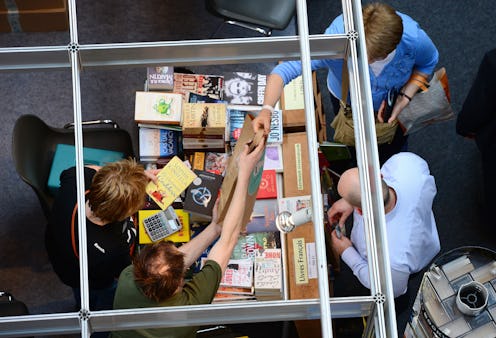Books
Will This New Book Pricing Model Pay Off?
If a small publisher wants to stand out in an industry where the Big Five publishing companies rule, it has to forge new paths. Luckily, these smaller companies have more flexibility and leeway to take big chances, and some of them are. The small publisher Brooklyn Arts Press' pay-what-you-want model for selling a the upcoming poetry book Word Kingdom in the Word Kingdom shows just how risky some presses are willing to be for art they believe in.
The pay-what-you-want or choose-your-own-price model has already been used by big names like Radiohead and Louis C.K. For Radiohead, thier experimental sales tactic for selling the album In Rainbows paid off big, and people have said it changed the music industry. Comedian Louis C.K. took a slightly different approach in the same spirit; he sold his stand-up special online for just $5, though instead of people just buying one copy and sharing it around for free, he found that people were happy to shell out the small sum for their own copy. Brooklyn Arts Press is hoping to add bookselling to this spirit of promotion.
Brooklyn Arts Press, or BAP, is an indie publishing house that releases mostly poetry books and chapbooks, but also fiction, essays, and nonfiction. It is run by a self-described group of "literary loyalists," headed up by managing editor and publisher Joe Pan. Pan spoke with Flavorwire about his experiment selling poet Noah Eli Gordon’s The Word Kingdom in the Word Kingdom, which he calls an "engaging, heady, musical steamroller of a book." Buyers are asked to pay just a $5 shipping fee for a hard copy of the book, in addition to any price they choose. Pan found that one average, people are choosing to pay $10 a copy, though some are jumping up to $18 and beyond.
He was inspired by what he called "plateauing poetry sales," which he said "kicked [his] ass into higher gear" on attempting to find new ways to sell BAP's poetry collections. And he credits new technologies with this flexibility many small publishers have today:
Because of the advancements made in digital printing, and offset printers having to compete for our business, we basically have the freedom now to publish whatever art forms suit our interests, at a much lower cost. The trick, though, is to find new ways to sell books.
Pan told Flavorwire that he essentially saw it as his duty in a small press to push the boundaries of publishing and selling books:
As a small press, I can afford to take more risks than the big publishers, so I should. I’m not as well connected as they are, so I have to work harder to build up our readership ... The risk of losing money is a primary concern for most publishers in general, but the larger risk for many small presses, whose efforts stem from a love of literature, is having a great book go unnoticed. Nobody can afford that.
As this BAP's book selling experiment ends, it will be super-interesting to see how successful the campaign was, and whether any other small publishing houses will catch on to the idea and run with their own innovative marketing tactics. But no matter what, BAP certainly has people talking, and that's as good as gold when it comes to selling.
